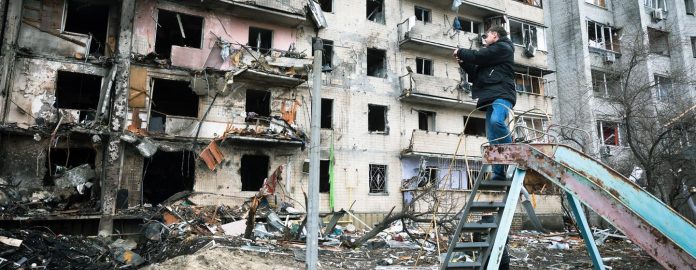The United Nations was established at the end of World War II “to save succeeding generations from the scourge of war”. Now that war has returned to Europe many ask what the United Nations can do to stop it. Following are 5 questions and answers regarding the instruments at the UN´s disposal in its efforts to secure international peace and security.
Can the Security Council stop a war?

Well, first let us review its mission.
The functions and powers of the Security Council are set out in the UN Charter, the Organization’s founding document.
The Security Council is made up of 15 members: five permanent seats belong to China, France, Russian Federation, the United Kingdom and the United States; 10 non-permanent seats rotate by election among other UN member countries. Itis the body that was granted the primary responsibility for the maintenance of international peace and security.
Under Article 25 of the Charter all members of the UN have the obligation to accept and carry out decisions adopted by the Council. In other words, actions taken by the Council are binding on all UN member countries.
When dealing with crises, the Council, guided by the UN Charter, can take several steps.

Acting under Chapter VI of the Charter, the Council can call upon parties to a dispute to settle it by peaceful means and recommend methods of adjustment or terms of settlement. It can also recommend the referral of disputes to the International Court of Justice (ICJ).
In some cases, the Security Council may act under Chapter VII of the Charter and resort to imposing sanctions. As a last resort, when peaceful means of settling a dispute are exhausted, it can even authorize the use of force by Member States, coalitions of Member States or UN-authorized peace operations to maintain or restore international peace and security.
The first time the Council authorized the use of force was in 1950 under what was referred to as a military enforcement action, to secure the withdrawal of North Korean forces from the Republic of Korea.
What is the ‘veto power’ and how can it be used?

The voting procedure in the Security Council is guided by Article 27 of the UN Charter which establishes that each member of the Council has one vote.
When deciding on “procedural matters”, nine members need to vote in favour of a decision in order for it to be adopted. On all other matters, an affirmative vote from nine members “including the concurring votes of the permanent members” is necessary.
In other words, a negative vote by any of the permanent five (China, France, Russian Federation, the United Kingdom or the United States) can prevent the adoption by the Council of any draft resolution relating to substantive matters.
Can the General Assembly step in when the Security Council is unable to take a decision on stopping a war?

According to the General Assembly’s 1950 resolution 377A (V), widely known as ‘Uniting for Peace’, if the Security Council is unable to act because of the lack of unanimity among its five veto-wielding permanent members, the Assembly has the power to make recommendations to the wider UN membership for collective measures to maintain or restore international peace and security.
In addition, the General Assembly may meet in Emergency Special Session if requested by nine members of the Security Council or by a majority of the Members of the Assembly.
However, unlike Security Council resolutions, General Assembly resolutions are non-binding, meaning that countries are not obligated to implement them.
Can a country’s membership in the UN be revoked?
Article 6 of the Charter reads as follows:

A Member of the United Nations which has persistently violated the principles contained in the present Charter may be expelled from the Organization by the General Assembly upon the recommendation of the Security Council.
This has never happened in the history of the United Nations.
Article 5 provides for the suspension of a Member State:
A Member of the United Nations against which preventive or enforcement action has been taken by the Security Council may be suspended from the exercise of the rights and privileges of membership by the General Assembly upon the recommendation of the Security Council.
Unless they agree to their own expulsion or suspension, permanent Council members can only be removed through an amendment of the UN Charter, as set out in Chapter XVIII.
The UN has, however, taken steps against certain countries to end major injustices. One example is the case of South Africa and the world body’s contribution to the global struggle against apartheid. The General Assembly refused to accept the country’s credentials from 1970 to 1974. Following this ban, South Africa did not participate in further proceedings of the Assembly until the end of apartheid in 1994.
What are the Secretary-General’s ‘good offices’?
One of the most vital roles played by the Secretary-General is the use of his ‘good offices’ – steps taken publicly and in private, drawing upon their independence, impartiality and integrity, and the power of quiet diplomacy, to prevent international disputes from arising, escalating or spreading.
At the end of March, Secretary-General Antonio Guterres invoked the use of his good offices and asked Under Secretary-General Martin Griffiths, the UN emergency relief coordinator, to explore the possibility of a humanitarian cease-fire with Russia and Ukraine, and other countries seeking to find a peaceful solution to the war.






